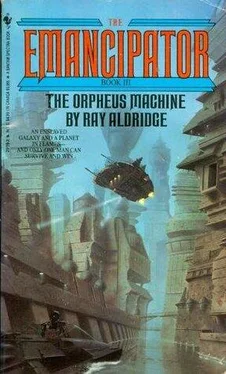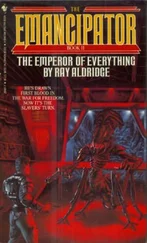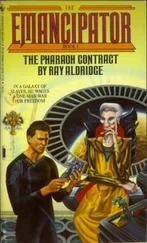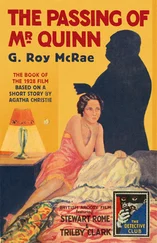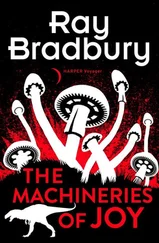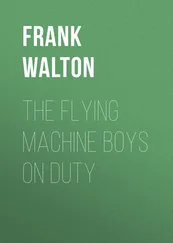The Gench turned to him. “Yes. Below. At the end of the corridor that crosses the back of this place is a door, long frozen in its sill.”
“Can you notify me of something at a distance? Send me a vision?”
“Yes — though not a powerful one. But something. All our faction’s strength is devoted to repressing the madness the majority sends against you. They will not expect us to send you a small piece of insanity.” Then the Gench drew its small transceiver from one of its mouths. “But why not use this?”
Ruiz repressed another gust of wild laughter. “Why not? Well, when the Moc is at least halfway to the far side of the maze, let me know. I’ll give you a channel.” He took the transceiver, keyed in a scrambled frequency, and fed in the proper decoding parameters. “And just so there’ll be no mistake, send me a vision too. Something that has meaning for us alone; do you understand?”
“Possibly,” said the Gench, accepting the transceiver.
Ruiz trotted down the staircase, the mindfire burning him. The ghost of the Machine squatted at the foot of the steps, looking up hungrily. As Ruiz grew near, the Machine grinned and stuck out a tongue. Ruiz saw that the tongue was a mass of intertwined arms… and all the hands beckoned languidly.
Ruiz forced himself to run through the ghost, and he kept his eyes half-closed, ready to ignore any horror that might appear in the interior of the ghost. As he passed through, he heard a faint resentful voice say: “Rude boy.”
He went down the central aisle, to the first of the two pillars, to which he attached a limpet mine, set for remote detonation. When he had mined the other pillar, he went to the back of the amphitheater and found the corridor that led to the maze.
He stopped before the door, which was a mass of ancient corrosion. He checked the contents of his explosives pouch, found that he had a half-dozen mines left. He needed to save enough to destroy the Machine — if he ever got close to it. Reluctantly, he took one out and set it for a low-yield explosion, then locked it to the door. Would it open the door without bringing down the roof? He looked up, and his drugged senses showed him the roof in unsteady movement, as if it were already settling toward him. It was so real a perception that he huddled back against the door, cringing.
“Ruiz Aw,” said the Gench’s whispery voice through his helmet speaker.
“Yes?” He looked down at his feet, trying to focus on something other than the collapsing roof.
“The bug is checking the first of your kills. Is that far enough?”
Ruiz resisted the impulse to take a deep breath. “I hope so,” he said. “Weren’t you going to show me something?”
“If you say I must, then I will.”
In the center of the amphitheater, a shape swirled into existence. It coalesced into a huge but familiar face. Ruiz recognized the vulpine features of Publius the monster maker, who smiled gently and horribly at him, and then looked down at the ghost of the Orpheus Machine with a great evil wistful longing.
“All right,” said Ruiz. “All right.” The face broke apart and dissipated in dim streamers. Ruiz set the mine’s timer and ran away as fast as he could, willing himself not to look up at the roof, or to think of all that weight above him, the kilometers of meltstone and alloy.
When he was halfway back to the stairs, the mine at the door detonated, and in the fading roar he listened for the grinding sound of collapse. It didn’t come, but by the time he reached the foot of the stairs, another terrible sound came to him — the scrabble of the Moc’s claws, as it forced its way through the demolished door. Even the ghost of the Machine turned to look, so that he didn’t have to endure its regard as he ran through it.
He climbed up a few treads, then turned as the Moc broke through with a clattering crash. As he stabbed at the controller slate on his forearm, he caught sight of a blur moving away from the amphitheater’s back.
The mines fired with a flat crack; the explosions blasted the bases of the pillars away, as though invisible hands had jerked them apart.
The Moc paused for an instant and then streaked forward. The roof fell toward it, so slowly that Ruiz was suddenly sure that the Moc would outrun gravity.
The great insectoid seemed to fill the world; Ruiz could see nothing else. He tried to get off a shot from his ruptor, but the Moc dodged so artfully that his shot went nowhere close.
He felt all the strength leave his legs. He was starting to sag toward the stairstep when a falling slab finally caught the Moc and took it down. Dust exploded upward, but not before Ruiz saw that the slab had crushed one of the Moc’s lower legs, and that more stone was falling toward the creature, which jerked and mewled, trying to get loose.
When the dust parted briefly again, Ruiz saw that a layer of stone two meters deep covered the amphitheater’s floor, and that nothing seemed to move beneath it.
The machine wailed, as if from a hundred different throats. Corean held her hands over her ears. “What is it?” she cried. The ground trembled and a deep rumble rose and fell.
“He’s killed your bug. Oh, he’s too strong, too strong. I feel my mortality on me.” It wailed again, a sound that sent shudders through Corean’s body.
“Shut up,” she said. It did. “He won’t destroy you as long as I’m here.”
It laughed hideously, until she shrieked at it to stop.
“What now?” Ruiz asked himself. He looked down at the maze from the alcove. Nothing moved below, except for the walls, which swam in the slow hallucinatory dance of the mindfire.
“Your enemy cowers with the Machine, beneath its armored hat. You must extract her before you can set your charges.”
“How?”
“You must devise a suitable scheme. Is this not your great skill?” The Gench spoke dispassionately.
“No,” said Ruiz. “My great skill was less admirable; the schemes were only means to that end.”
“Nonetheless,” said the Gench. “Examine your past dealings with the slaver. What deceptions have worked with her before? Humans rarely live long enough to learn from their mistakes.”
“I’ve lived a long time,” said Ruiz, somewhat resentfully. He tried to concentrate, to shut out the shimmering illusions of the mindfire — though he dared not close his eyes.
To his surprise, an idea came to him. It was a dangerous idea, and it depended on Corean’s foolishness, but it had one great advantage: If it failed, he would cease to suffer.
“Tell me,” he said to the Gench. “Are you capable of lying to the Machine?”
The Gench failed to respond, for long moments. Ruiz had begun to search for new ideas, when it finally spoke. “Possibly. Can you believe the lie? Will you allow me to take your reason, for a time?”
Ruiz turned to look at the Gench, and considered what a monstrous alien thing it was. Its eyespots grew still, ceasing their endless circulation over the lumpy skull.
“Why not?” he said. He heard Nisa’s clone take a sudden gasping breath.
* * *
Corean looked out through a slit in the Machine’s inner shrine, clutching her splinter gun in sweaty hands. She had almost grown used to the loathsome bulk of the Machine nearly touching her back.
“Does he come, yet?” asked the Machine in a throaty whisper.
“No,” she said, but as she spoke, she heard Ruiz shout in his cold deep voice. “Don’t shoot,” he said from some hiding spot just inside the maze. “I’ve been captured. I’m coming out, with my captor.”
The Machine laughed fearfully. “Kill him the instant you get a clear shot.”
“Yes,” she said. She slung the splinter gun and armed the big ruptor strapped to her left arm — if Ruiz Aw stood still and allowed her a shot at a perpendicular surface, the ruptor would be powerful enough to penetrate his armor and turn his chest to slush.
Читать дальше
